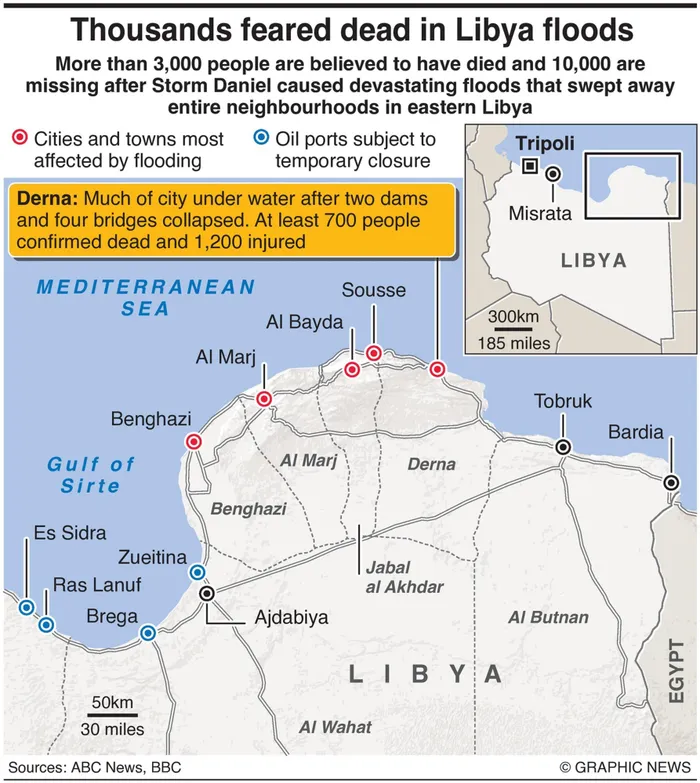Thousands missing and feared dead, after floods submerge eastern Libya

September 12, 2023, More than 3,000 people are believed to have died after Storm Daniel caused devastating floods that swept away entire neighbourhoods in eastern Libya. Graphic shows areas of Libya hit by flooding.
Picture: AFP/September 11, 2023 – Overturned cars lay among other debris caused by flash floods in Derna, eastern Libya, on September 11, 2023. Flash floods in eastern Libya killed more than 2,300 people in the Mediterranean coastal city of Derna alone, the emergency services of the Tripoli-based government said on September 12.
By Sarah Dadouch
Thousands are feared to have died in floods that engulfed Libya’s east after Storm Daniel smashed into the North African country, swallowing whole neighbourhoods and with them, an unknown number of residents.
The city of Derna has been most acutely affected, after raging torrents of water tore through two dams and swept entire buildings into the sea. Othman Abdul Jalil, health minister and spokesperson of the UN-recognised government in west Libya, told local television channel al-Masar that the situation continues to deteriorate in the western city, and at least 2,000 have been found dead.

“I expect numbers of dead will rise to 10,000,” he told the channel early on Tuesday, adding that there is yet to be any confirmed final death count as many parts of the city remain inaccessible. Derna is estimated to have had around 90,000 residents.
“We call on friendly countries to help us save what is left of Derna,” Abdul Jalil said. “The field hospital is filled with corpses.”
Tamer Ramadan, the head of the Libyan delegation of the International Federation of the Red Cross and Red Crescent Societies, also said there was a staggering number of people still missing, reaching up to 10,000 in the five most affected cities.
“Our teams on the ground are still doing their assessment, but from what we see and from the news coming to us, the death toll is huge,” Ramadan told reporters in Geneva via video link from Tunisia. He said he expects deaths will be in the thousands.
Authorities in both the east and the west declared Derna a disaster zone on Monday after the water poured through it, submerging parts of the city in copper-coloured liquid.
Libya’s infrastructure has suffered repeated blows over the course of a civil war that broke out after the fall of Muammar Gaddafi in 2011. The country now remains divided between rival governments in the east and the west.
The west, which houses the UN-backed government, has rushed to help the east after the apocalyptic images surfaced. Telecommunication networks were down on Monday and early Tuesday: Abdul Jalil said they had lost contact with Derna’s emergency services at 3.30am. TV channel al-Masar said it also could not reach its correspondents on the ground.
General Khalifa Hifter, head of a coalition of factions and irregular fighters known as the Libyan National Army in the east, in a statement early on Tuesday called on other parts of the country to help the cities and towns in the Green Mountain area, which includes Derna and other affected places.
The United Arab Emirates, Egypt and Jordan, supporters of the LNA, have dispatched search and rescue teams and medical personnel to provide assistance. Turkey, who has traditionally supported the LNA’s foe in the west, the Government of National Accord, said it had dispatched three planes carrying search and rescue teams and humanitarian supplies.
Asmahan Belaoun, a member of parliament with family ties to Derna, told The Post on Monday that the highest priorities right now are providing a telecoms network and helicopters to find survivors. She added that, as winter approaches, the dams must be urgently rebuilt to keep any future flooding at bay.
The US Special Envoy for Libya, Ambassador Richard Norland, said the embassy was co-ordinating with the United Nations and Libyan authorities, and had issued an official declaration of humanitarian need which “will authorise initial funding that the United States will provide in support of relief efforts in Libya”. He added that many Libyan Americans had reached out, “anxious to make private contributions to relief efforts”.
Sarah Dadouch is a Beirut-based Middle East correspondent for The Washington Post. She was previously a Reuters correspondent in Beirut, Riyadh and Istanbul.
This article was first published in The Washington Post
Related Topics: